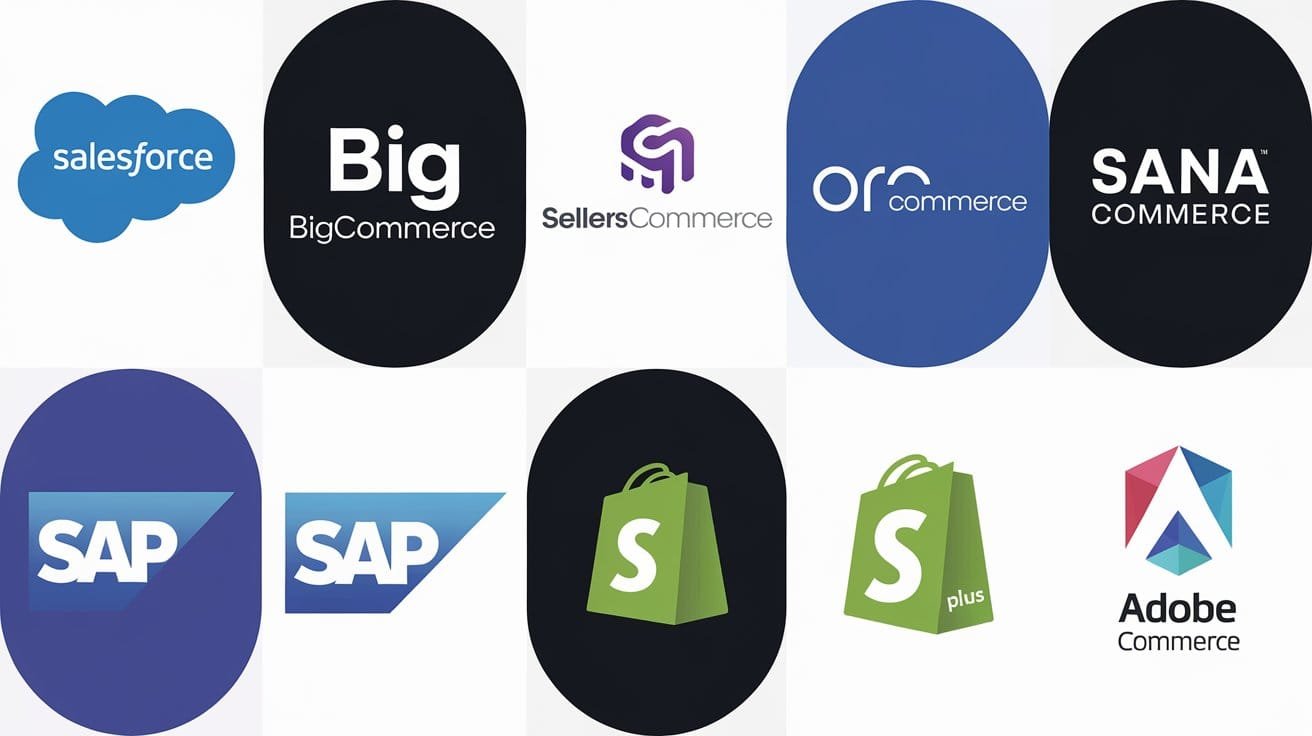With many options available, picking the right e-commerce platform is essential as online trade increases. B2B e-commerce is more than just selling products online; it’s about building strong business relationships. Features like personalized pricing, secure payments, and easy-to-use services are significant to your success.
The B2B e-commerce platform is massive, valued at around $28 trillion, and expanding. With so many choices, selecting an e-commerce platform that fits your unique needs can be challenging. This article explores the best e-commerce platforms, helping you understand their features and benefits. By the end, you’ll be better equipped to make a decision that can improve your business operations and drive growth.
Analyzing the Current B2B Market Scenario Through Data
The global B2B market is increasing, and it is projected to reach approximately $28 trillion by 2024. As buyers and sellers adapt to an increasingly digital world, the need for an omnichannel presence has never been higher. Recent reports show that around 64% of modern B2B buyers prefer digital channels, and 80% use mobile devices during their buying journey.
Customer experience is crucial, as B2B companies face challenges like lengthy purchasing processes and a need for more personalization. To stay competitive, significant players in the B2B space are using artificial intelligence and other advanced technologies to streamline operations and enhance customer engagement.
With the right tools and strategies, businesses can take advantage of the evolving B2B landscape, ultimately boosting sales and improving customer satisfaction.
Features Considered While Compiling This List
When evaluating e-commerce platforms, I focused on several key features for ensuring a successful online business experience. Here’s what I considered:
- Integrations: I looked at how well each platform connects with existing business systems, especially ERP software. Good integration allows for seamless data transfer and reduces manual errors, vital for managing inventory and orders.
- Cost: Understanding the total cost of ownership was crucial. I examined the upfront fees and ongoing costs, such as subscription fees, transaction fees, and costs for additional features. Knowing these costs helps businesses budget effectively.
- Security: Given the sensitive nature of B2B transactions, I prioritized platforms with solid security features. This includes data encryption, secure payment processing, and compliance with industry standards to protect customer information.
- Customization: The ability to tailor the platform was essential. I focused on platforms that allow businesses to customize the website experience, user workflows, and product listings to meet their specific needs, enhancing customer satisfaction.
- Scalability: I evaluated how easily each platform can grow alongside the business. Scalability is crucial for handling increased product listings, customer traffic, and transaction volumes without compromising performance.
- Extensibility: I examined whether the platform can support third-party tools and additional features. Extensibility is vital for businesses that want to add functionality in the future, like marketing tools or analytics.
- Technology/Architecture: I assessed the technology and architecture of each platform. Modern technology ensures better performance, faster load times, and a reliable user experience, essential for retaining customers.
Salesforce Commerce Cloud
Salesforce Commerce Cloud is a top e-commerce platform that supports over 13,000 online stores globally. As a Software-as-a-Service (SaaS) platform, it offers flexibility, though not to the same degree as open-source platforms, and includes the benefit of not needing to manage hosting since it’s all in the cloud.
Salesforce’s B2B solution was enhanced with the acquisition of CloudCraze, now known as Salesforce Commerce B2B on Lightning. This version is built on Salesforce’s architecture, allowing for highly customized user experiences and complex transaction workflows that B2B environments often require.
Key Features and Benefits:
- Great Customer Support: Salesforce is known for its excellent support, including dedicated Customer Success Managers (CSMs) who help clients.
- Customer 360 Tool: This tool helps track customer journeys across various touchpoints, giving a clear view of buying behaviour.
- Seamless Integration: If you’re already using Salesforce tools, integrating the e-commerce platform makes sense as it works well within their ecosystem.
- Flexible SaaS Platform: Unlike many rigid platforms, Salesforce Commerce Cloud is relatively flexible, allowing for customization but with some trade-offs.
BigCommerce
BigCommerce is among the best e-commerce platforms and has powered over 136,000 e-commerce stores to date. With an open-source Buyer Portal, companies can create tailored buying experiences to meet complex B2B needs while keeping costs manageable. The platform streamlines credit management, making handling accounts and payment visibility for different customer groups easy.
BigCommerce improves the purchasing process through tools like Sales Rep Masquerade, allowing representatives to assist customers by logging in on their behalf to place orders. Controlled access and customizable buyer tiers ensure personalized experiences, while the invoice portal speeds up invoicing and payments.
For businesses operating in multiple regions, BigCommerce supports localized storefronts with features like custom catalogs and pricing for specific customers. The platform offers mobile optimization and headless support, helping businesses future-proof operations while enhancing sales and customer satisfaction.
Key Features and Benefits:
- Salesperson Assignment: Salespeople can be assigned to specific companies, focusing on the companies they are nurturing.
- Invoice Payments: Customers can pay their invoices directly through BigCommerce, streamlining the payment process.
- Automatic Company Approval: This feature enhances efficiency for new company registrations.
- Shared Company Addresses: Multiple users within a company can share addresses, simplifying purchasing for businesses with several locations.
- Custom Fields in Checkout: Users can add custom fields to checkout and account pages, enhancing the buying process.
SellersCommerce
SellersCommerce is a robust e-commerce platform designed for wholesale customers. It has launched over 3,500 stores and specializes in uniforms, medical equipment, promotional products, and fasteners.
The platform offers tools to streamline workflows, automate order management, and provide personalized buying experiences through curated catalogs and flexible payment options like purchase orders and credit lines.
SellersCommerce has features like real-time inventory syncing, restocking reminders, and seamless integration with ERP systems. Its unified administrative portal helps manage customer data, define pricing based on contracts, and create targeted marketing campaigns.
Key Features and Benefits:
- Tailored for Wholesale: Meets the unique needs of wholesale buyers, offering personalized catalogs and bulk ordering solutions.
- Multiple Payment Options: Supports various payment methods, ensuring smooth transactions for bulk buyers.
- Seamless Order Management: Automates the ordering cycle with restocking reminders and real-time inventory syncing.
- B2C Experience for B2B Buyers: Provides an easy-to-navigate ordering experience optimized for all devices.
- Integrated Systems: Syncs with ERP and inventory management systems for centralized sales data and customer insights.
OroCommerce
OroCommerce is a powerful e-commerce platform built specifically for mid-market and enterprise-level businesses. It helps companies create tailored online stores, customer portals, and wholesale platforms with B2B needs in mind.
What sets OroCommerce apart is its dedicated focus on B2B. Unlike many platforms built for both B2C and B2B, OroCommerce offers specialized features like managing corporate accounts, personalized pricing, and Configure-Price-Quote (CPQ) processes. These features come out of the box, reducing costs and project timelines.
Key Features and Benefits:
- SEO Optimized Templates: OroCommerce provides templates that improve brand visibility and allow easy content management.
- Automated Workflow Engine: This adapts to your business needs by simplifying the buying and selling process.
- Easier Tracking: Users can easily track essential statistics like sales and products, organized neatly for quick access.
- Easy Quote Negotiations: Customers can request quotes quickly, allowing for negotiations with sales reps.
Sana Commerce
Sana Commerce is a B2B e-commerce platform that integrates directly with existing ERP systems for a smooth online buying experience. Founded in 2007 in Rotterdam, it powers around 2,000 B2B websites. With extensive B2B expertise and a focus on ERP integration, Sana Commerce helps automate complex processes and deliver a personalized shopping experience.
Key Features and Benefits:
- Direct ERP Integration: Sana Commerce Cloud offers real-time, two-way data synchronization for accurate operations.
- Proven ROI: The average customer sees an 11% increase in returning customers and a 16% decrease in order errors.
- Personalized Pricing: Businesses can set customer-specific pricing, allowing for tailored shopping experiences.
- Customer-Specific Catalogs: Displays custom catalogues and pricing for different customer groups.
- Multiple Payment Options: Supports various B2B payment methods for convenience.
- Self-Service Portals: Customers can view order history, track shipments, and manage profiles for a complete self-service experience.
- Global Scalability: Supports multilingual and multicurrency transactions, enabling international expansion.
SAP Commerce Cloud
SAP Commerce Cloud is a top choice for large businesses needing an e-commerce platform. It’s designed for B2B, B2C, and hybrid models, offering highly personalized, multi-channel experiences. It manages complex catalogs, configurations, and integrations with ease. SAP Commerce Cloud’s built-in B2B features are ideal for streamlining purchasing processes with self-service tools, AI-powered merchandising, and integration with ERP systems.
Key Features and Benefits:
- B2B Focused Tools: SAP Commerce Cloud supports unit-level orders, quote management, and organizational commerce tools, making it easier to handle complex business processes.
- Real-Time Inventory Tracking: Provides real-time insights on stock availability across multiple locations and can even predict future stock levels for better planning.
- Headless Commerce: Businesses can create seamless e-commerce experiences across different channels using an API-first approach.
- PunchOut Integration: This feature allows businesses to browse catalogs, create shopping carts, and submit orders from procurement systems.
- Personalized Experiences: With early login, businesses can offer custom shopping experiences with tailored content, product suggestions, and promotions.
- Self-Service Portals: Customers can manage their accounts, track orders, and oversee budgets independently, improving the overall experience.
- Pre-Built Integrations: SAP Commerce Cloud easily integrates with other SAP and third-party tools, making it scalable and flexible.
NetSuite SuiteCommerce
NetSuite SuiteCommerce by Oracle is one of the best e-commerce platforms for managing everything from inventory to customer data in one place. It allows businesses to streamline operations and reduce manual work while offering a great customer experience. SuiteCommerce helps manage bulk orders, provides flexible payment options, and enables customers to track orders.
Key Features and Benefits:
- Unified Platform: Integrates e-commerce, inventory, point of sale, and financial systems, reducing the need for external tools.
- Streamlined Billing: Offers easy access to invoices, account balances, and payment options, including ACH and invoice billing.
- Customer Self-Service: Customers can manage their orders, returns, and account queries, saving the sales team time.
- Personalized Experience: SuiteCommerce allows customized pricing, credit limits, and AI-powered product recommendations based on customer behavior.
- Secure Checkout: This site offers PCI DSS compliance, fraud protection, and multiple payment options for a safe and seamless checkout.
- Advanced Site Management: Non-developers can easily manage content and update the site using SuiteCommerce’s drag-and-drop tools.
Shopify Plus
Shopify Plus is a powerful e-commerce platform for businesses selling both B2B and B2C. It allows businesses to create custom online stores with tailored catalogs, flexible payment options, and self-service portals. Shopify Plus supports complex buying processes for multiple customers and locations, making it easier to manage orders at scale.
Key Features and Benefits:
- Complete Customization: Shopify Plus lets businesses tailor the storefront, payment terms, and user experience with B2B-optimized themes.
- Seamless Integrations: It easily connects with existing order and inventory systems, as well as platforms like Acumatica and Microsoft Dynamics 365.
- Bulk Ordering: Simplifies large orders with easy-to-navigate product pages and dedicated order forms.
- Automation with Shopify Flow: Automates daily tasks, including identifying high-risk orders, saving time and effort.
- Sales Rep Empowerment: Sales reps can manage customer accounts and place orders on their behalf.
- Custom Buyer Experience: Tailor’s catalogs and offers and sets specific purchasing rules for different buyers.
Adobe Commerce
Adobe Commerce, formerly Magento, is a flexible and powerful e-commerce platform used by B2B businesses. It’s highly customizable, allowing businesses to control every storefront aspect. Adobe Commerce supports a wide range of product types and multiple stores, making it suitable for complex business needs.
Key Features and Benefits:
- Open-Source Customization: Adobe Commerce offers complete access to its code, enabling businesses to tailor the platform to their specific needs.
- Multi-Store Management: Manage different brands or channels from one admin panel.
- Complex Product Handling: Supports various product types, which is helpful for manufacturers with complicated inventories.
- Company Registration: Only approved businesses can register and access the wholesale platform, ensuring quality control.
- Role Management: Multiple user roles streamline purchasing by assigning approval rights to managers and employees.
- Requisition Lists: Make repeat orders simple with a list of frequently bought items.
- Request a Quote: Customers can submit bulk order requests, allowing for pricing negotiations.
- CSV Order Uploads: Large orders can be uploaded using CSV files, saving time.
- Custom Payment Methods: Offers flexible payment options for different regions or user groups.
Sales Rep Commissions: Track sales rep performance and commissions easily through built-in tools.







